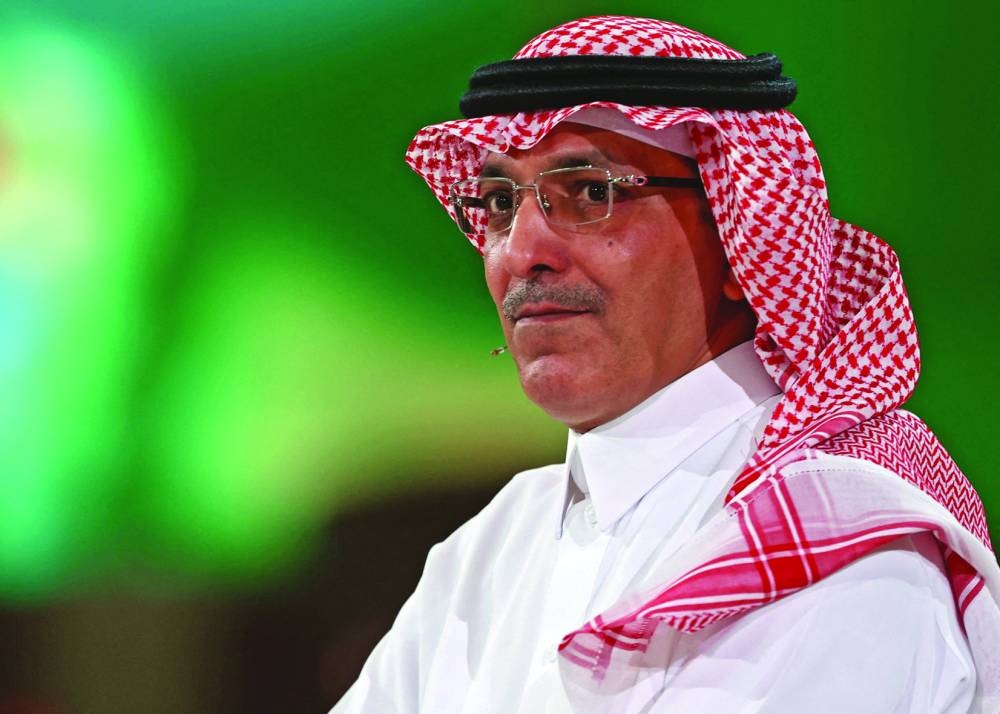Saudi Arabia is open to discussions about trade in currencies other than the US dollar, according to the kingdom’s finance minister, in what could be another challenge to the greenback’s hegemony.
“There are no issues with discussing how we settle our trade arrangements, whether it is in the US dollar, whether it is the euro, whether it is the Saudi riyal,” Mohamed al-Jadaan told Bloomberg TV yesterday in an interview in Davos.
“I don’t think we are waving away or ruling out any discussion that will help improve the trade around the world,” al-Jadaan said.
The world’s largest oil exporter, which has maintained a currency peg to the dollar for decades, is seeking to strengthen its relations with crucial trade partners including China. The kingdom is a pillar a petrodollar system established in the 1970s that relies on pricing crude exports in the US currency.
During President Xi Jinping’s visit to Riyadh last year, the two countries agreed to boost co-ordination on energy policy and exploration. During that trip Xi said that China would make efforts to buy more oil from the Middle East and also wanted to settle that trade in the yuan.
“We enjoy a very strategic relationship with China and we enjoy that same strategic relationship with other nations including the US and we want to develop that with Europe and other countries who are willing and able to work with us,” al-Jadaan said.
Saudi Arabia is also working with multilateral institutions to provide support to Pakistan, Turkiye and Egypt, as part of the kingdom’s largesse to nations it deems “vulnerable,” al-Jadaan said.
“We are investing heavily in these countries and will continue to look for opportunities to invest,” he said. “It’s very important to bring stability.”
The minister said his country is looking to invest $10bn in Pakistan. It already extended the term of a $3bn deposit to boost its foreign-currency reserves late last year, and Saudi Arabia is now exploring the possibility of increasing the amount.
“We are providing even oil and derivatives to support their energy needs,” al-Jadaan said. “So there is a lot of efforts, but we wanted this to be conducted.”
The kingdom is also discussing with the World Bank and other institutions how can it be “more creative to provide that support” to Pakistan, the minister said.
Saudi confident on attracting more foreign investors
Saudi Arabia is confident it can attract enough large-scale investment to make significant strides in diversifying the economy of the world’s largest oil exporter, according to a top official.
Authorities believe they have “so many enablers that can attract a lot of partners,” said the Saudi Minister of Economy and Planning, Faisal Alibrahim, citing the kingdom’s access to natural resources, regulatory changes, and its mostly young population, reports Bloomberg.
“We have the right kind of incentive structures and governance and processes in order to attract the right kind of investors for the right kind of returns for them as partners,” Alibrahim said an interview on the sidelines of the World Economic Forum’s annual meeting in Davos, Switzerland.
Hitting targets for attracting foreign direct investment as part of Crown Prince Mohamed bin Salman’s plans to overhaul the Saudi economy has been a challenge. That plan envisages lifting foreign investment to 5.7% of economic output.
Yet most of the $19.3bn foreign investment in 2021 — the most since 2010 — came from state oil company Saudi Aramco selling part of its pipeline unit, rather than going into new industries.
The Saudi government has made more than 700 regulatory changes as it seeks to attract investors, said Alibrahim. “We’re very serious about our diversification efforts,” he said. “We’re open and we’re talking to all partners who’re interested in the Saudi story.”
Saudi Arabia saw the strongest increase in employment in almost five years as business conditions in its non-oil economy — the engine of job creation for the kingdom — improved at a slightly slower pace at the end of last year following a surge.
“We still want to create more jobs and we want to even reach higher levels.” said Alibrahim. He doesn’t see higher interest rates impacting the Saudi private sector.

Saudi Minister of Finance Mohamed al-Jadaan,
